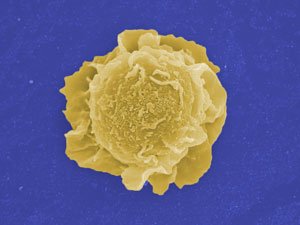Monocytes in the mix
Understanding how monocyte cells generate specialized immune system cells may help target immunity against cancer
Published online May 16, 2018
A human monocyte cell — these cells may hold key information about supporting immunity against cancer.
A human monocyte cell — these cells may hold key information about supporting immunity against cancer.
© 2018 Benoit Malleret, Singapore Immunology Network (SIgN), ASTAR
An international research team has helped unravel important details of how blood cells called monocytes develop into crucial ‘helper’ cells of the immune system1. “The work should ultimately allow better and more personalized treatment,” says team member Florent Ginhoux of the ASTAR Singapore Immunology Network.
The immune system is a complex network of interacting cells circulating throughout the body, protecting us from invading microorganisms and from diseases originating from within. Scientists and clinicians are learning how to select and modify immune system cells to target them more effectively at specific diseases, especially cancer.
“Monocytes have many faces,” says Ginhoux, explaining how these white blood cells perform various roles in immunity, and develop or differentiate into a range of more specialized cells. Monocytes circulating in the blood can ingest and destroy foreign invaders and promote inflammation of diseased tissues. One of their most crucial roles, however, is to develop further into specialized ‘antigen-presenting cells’. These interact with parts of foreign organisms or diseased cells and display molecular tags called antigens on their surface, which can interact with other cells of the immune system. This antigen-presenting activity initiates an immune response against the source of the antigens, whether invading micro-organisms or diseased cells such as cancer cells.
By understanding how monocytes differentiate into these vital antigen-presenting cells, the team, led by Joachim Schultze and Andreas Schlitzer of the University of Bonn, hope to learn how to stimulate their activities more effectively to fight cancer and other diseases.
Their work, performed with cultured human cells, revealed details of the molecular signals that regulate the differentiation of monocytes into a complex mixture of cell types. The team also identified time-dependent phenomena that control the developmental fate of monocytes. The wide variety of cell types produced from the monocyte population was a particularly significant surprise.
“Through this work we now understand the molecular make-up and clinical potential of the cells much better,” says Ginhoux. He explains that a logical next step will be to examine similar cells that are being used clinically, to see if they also display the mixed cell-type characteristics found in the lab studies. This may reveal ways to improve the clinical use of the cells by identifying and producing the most effective specific cells for the treatment of each disease and hopefully individual patients.
“Drilling down to the single cell level will bring better treatments,” Ginhoux emphasizes.
The A*STAR-affiliated researchers contributing to this research are from the Singapore Immunology Network.
Reference
Sander, J., Schmidt, S. V., Cirovic, B., McGovern, N., Papantonopoulou, O. et al. Cellular differentiation of human monocytes is regulated by time-dependent Interleukin-4 signaling and the transcriptional regulator NCOR2. Immunity 47, 1051-1066 (2017).| Article
Related Links
Infectious disease: Gut bacteria implicated in liver inflammation
Immunology: Using a mouse to make an 'iMac'
Allergy: Clinging on to the memory

If you donate 1 SBD or STEEM to @a-a-a I will resteem your last post to over 72,500 followers on my 2 accounts @a-a-a and @a-0-0